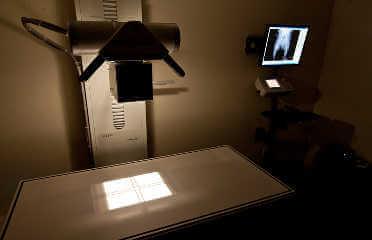
Effective diagnostics rely on two things: skilled veterinary professionals and the proper medical equipment. Tools like X-rays, ultrasounds, and labs and procedures such as endoscopy provide vital information on the state of your pet’s health. When an animal is sick, answers are needed quickly in order to hasten treatment and recovery. Ingleside Animal Hospital’s sophisticated diagnostic capabilities are a fundamental aspect to providing quality veterinary medicine.
Digital Radiology
All X-rays performed at Ingleside Animal Hospital are digital, which in today’s veterinary medicine sets the new standard in radiology technology. Digital images provide clear, high quality images that can be manipulated to provide detailed views. Although our doctors review every X-ray taken, additionally all X-rays are read by board-certified radiologists, specialists with advanced training, skill, and experience. Our in-house digital radiographs (X-rays) are extremely helpful for diagnosing a wide array of medical and surgical problems.
Ultrasound
Veterinary ultrasound is another important non-invasive diagnostic device that gives us an inside look at the actual functioning of your pet’s body. Soon to be an in-house service, ultrasound is used largely for abdominal and cardiac issues. It is helpful in gaining a comprehensive diagnosis of diseases of the heart, kidney, liver, gallbladder, spleen, and other internal organs.
Lab Services
Ingleside Animal Hospital provides a wide range of veterinary laboratory services:
- Blood work and blood panel services
- Hematology/histopathology
- Cytology
- Urinalysis
- Fecal
- Electrolyte analysis
Many of our labs are done onsite and in-house, so results can be immediate. For routine labs, we may choose to send them out to our network of trusted outside laboratories. We work with a number of veterinary university laboratories, which is very helpful in complex cases.
Endoscopy
Endoscopy is indicated when routine blood and urine tests, X-rays, and ultrasounds do not give an answer to the cause of the illness. An endoscope is a long, flexible tube with a tiny camera at the tip, and within the tube is a channel that allows the passage of a variety of instruments, including snares and biopsy items. An endoscope is used to help diagnose and treat a variety of gastrointestinal and respiratory disorders. Endoscopic procedures are often used to recover foreign bodies that have been ingested.
Our commitment to advanced diagnostics demonstrates our pledge to providing the best veterinary medicine for your pet. If you still have other questions and you'd like to reach out to us, you can call us directly at (602) 840-3446
For more than five decades, families from greater Phoenix, Arcadia, Paradise Valley, Tempe, and Scottsdale in Arizona have come to rely on our trustworthy and compassionate care. As an AAHA-accredited, Fear Free, and Cat Friendly facility, your pet’s well-being and comfort are our highest priorities.
